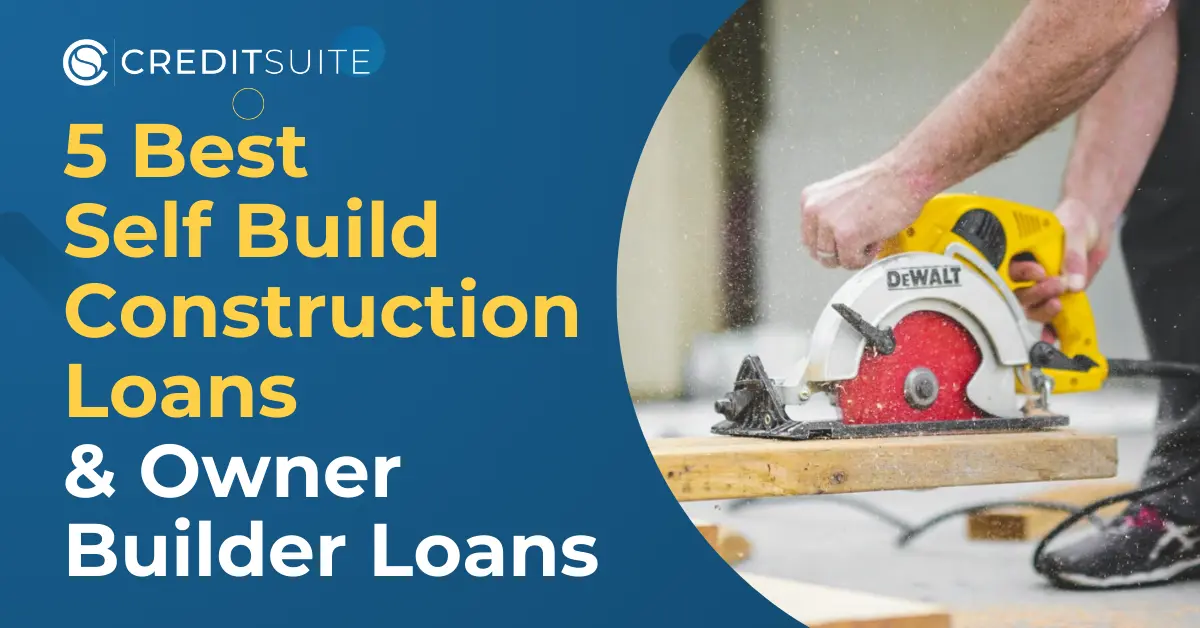If you want to finance a new house build, it pays to do your due diligence. Let’s explore the best self-build construction loans, their benefits, and how you can find the right one.
Self Build Construction Loans
- FHA One-Time Close Construction-to-Permanent Loan
- USDA Combination Construction-to-Permanent (Single Close) Loan
- TD Bank Construction Loan
- Cardinal Financial One-Time Close Loan
- Hard Money Loans
Self-Build Construction Loans Compared
| Loan | Best For | Credit Score Requirements | Minimum Down Payment |
| FHA One-Time Close Construction-to-Permanent Loan | Best Overall for Self-Build Homes | 620 | 3.5% |
| USDA Combination Construction-to-Permanent
(Single Close) Loan |
Best for Rural Borrowers | 640 | 0 |
| TD Bank Construction Loan | Best for Flexibility | 720 | 20% |
| Cardinal Financial One-Time Close Loan | Best for Not-So-Good Credit Scores | 550 but may vary | Undisclosed |
| Hard Money Loans | Best for Real Estate Investors | Varies | Varies |
FHA One-Time Close Construction-to-Permanent Loan
The Federal Housing Association (FHA) offers a one-time close construction-to-permanent loan through qualified lenders. This secure, government-backed loan program covers:
- One-unit, stick-built primary residences
- Modular homes
- New manufactured housing
“One-time close” means you only close once, meaning you don’t have to go through the hoops of getting a short-term construction loan and then a conventional loan once construction is done. Instead, you get one loan that covers all your financing needs (for the land, building materials, construction costs, and permits).
The interest is locked in once you get the loan; you won’t have to worry about any unforeseen changes in your interest rate when the market fluctuates. Plus, the loan turns into a traditional mortgage or end loan once your build is complete, and you won’t need to pay any monthly payments until that happens.
Another great thing about an FHA construction loan is that it’s relatively easy to qualify. As of 2024, the minimum requirements are:
- A credit score of 620
- Debt-to-income ratio up to 50%
- Minimum of 3.5% down payment
If you or your co-borrower are veterans, you may be eligible for a 0% down payment up to the max VA lending limit in your county. Otherwise, the down payment is 3.5% up to the max limit of your county.
You can also pay the down payment with your home equity if you have previously owned land. In any case, make sure to find an Equal Housing Lender who is also FHA-approved.
USDA Combination Construction-to-Permanent (Single Close) Loan
Whether you’re building or buying a home in a rural area, one of the best types of financing to consider is a USDA loan. If you’re trying to buy a home in an eligible rural area, you’d go for a traditional USDA loan. However, if you want to build your house from scratch, your best bet is a USDA Combination Construction-to-Permanent Loan.
Like an FHA construction loan, this loan program will cover the costs of constructing your home. It will then convert into a permanent mortgage afterward, but you only have to close on the loan once.
One of the biggest advantages of this loan is that no down payment is required, saving you the hurdle of saving up a ton of money upfront. Plus, there is minimal risk for lenders and contractors since the loan is backed by the USDA.
(It’s worth mentioning that getting comprehensive builders’ risk insurance is another way to offset some of the building construction risks.)
However, according to Rocket Mortgage, it may be challenging to find a lender that offers this type of loan. You also have to be in an eligible rural area and find a USDA-approved builder to qualify.
On the flip side, the requirements are less stringent than conventional or personal loans. These include:
- A credit score of 640
- Debt-to-income ratio less than 41%
- An income that does not exceed USDA income limits
- New construction warranty from the contractor or builder
TD Bank Construction Loan
TD Bank offers one of the most flexible contractor loans for people who want a more personalized loan. With a TD Bank construction loan, you can either finance new home construction where the contractor requires payments in installments or build a new home on land that you already own.
How does this owner-builder construction loan work? Once you get approval, TD Bank will let you withdraw funds on a schedule. This means that you can pay your monthly installments with the builder until construction is complete. The money is only available to either you or the builder and can only cover the costs of building the home, excluding furniture, furnishings, and decor.
TD Bank’s construction loan stands out from the rest due to its flexibility. For one, they offer fixed or adjustable rate options. Plus, you have flexible down payment options; TD Bank will count any funds you contribute to the transaction as a down payment.
You can also use the loan to pay for an outstanding loan that you already have on the property. Moreover, you only have to make interest-only payments while the construction project is ongoing. Once your home is complete, you can convert to a fixed-rate permanent loan where you’ll pay both the principal and interest.
Requirements include:
- A credit score of 720
- A down payment of 20% for builds up to $1.5 million
- Construction project contract
- Financial statements of the builder
Cardinal Financial One-Time Close Loan
Cardinal Financial is a well-known national bank that offers a one-time close construction loan designed to fund land costs, building materials, and construction permits. Similar to an FHA and USDA loan, you only have to close one time instead of taking out two separate loans for land and a traditional mortgage.
Credit Suite rates this owner-builder construction loan program best for people with lower credit scores. Borrowers can qualify for a VA or FHA loan with scores as low as 550. The lender also offers jumbo loans for people with credit scores of at least 660.
Aside from convenience, Cardinal Financial’s one-time loan structure means there will only be one hard pull on your credit when you apply instead of two. Additionally, you’ll make interest-only payments during the construction project, which can potentially save you money.
You can also consider a renovation loan if you happen to buy a fixer-upper.
One disadvantage is that the requirements aren’t clearly stated on their website. However, you can get in touch with a mortgage loan officer to find out if you qualify, how much you can borrow, and what type of loan structure will best fit your needs.
Hard Money Loans
What if you don’t qualify for a traditional loan? Or what if you need to finance a new home build ASAP? In these cases, you might want to consider finding a hard money lender to finance your home build.
A hard money loan is a secured, short-term loan that is less stringent with its requirements compared to conventional loans. If you qualify, a hard money loan can cover the costs of building materials, labor expenses, permits, and other construction costs. Loan terms usually last 6 to 18 months, but this can vary from lender to lender.
However, keep in mind that hard money loans often come with higher interest rates because the lenders are taking on more risk. That said, you need to find a lender that will meet you in the middle. Check out our list of the best hard money lenders to see how you can get started.
This type of loan is best for fast-paced home purchases or construction, which makes it ideal for real estate investors or house flippers handling multiple properties. Nevertheless, this type of loan can also work out for you if you’re looking to cash out fast, especially if you’re bidding on land.
How Credit Suite Can Help
Financing a new home build can be complicated, sometimes even more complicated than buying an existing house. However, it’s never impossible.
Credit Suite is your best friend when it comes to finding the best loan option for your unique situation. We can help you find the right construction lender, use business credit to buy real estate, or even leverage your existing lines of credit to fund a new home build.
Explore our blog to learn more about construction financing, credit card management, digital banking, commercial real estate financing, personal banking, and more!
FAQs
How do I get a home construction loan with no money down?
Some loan programs have no down payment requirements, including USDA and VA loans. However, these construction or land loans are only available when you meet their requirements (e.g., building a home in an eligible rural area for a USDA construction loan.)
Alternatively, you can use a home equity loan if you have a previously owned house. It may also be possible to qualify for a hard money loan or personal loan if you can offer collateral, such as the land you’re building your home on. Another option is to negotiate with a regional bank for a loan backed by your lot.
Is it hard to borrow money to build a house?
It depends on your financial situation and the type of owner-builder construction loan you’re applying for. Of course, some loans will be harder to qualify for than others. Generally, the better your financial profile, the easier it is to get a construction loan (similar to any traditional mortgage).
Qualification criteria vary from lender to lender. Some loans, like USDA or FHA construction loans, will accept credit scores as low as 620 or even lower. However, if you’re trying to apply for a larger loan amount, the minimum credit score requirement will likely be higher.
The down payment also matters. Having more money to put down may increase your chances of getting a self-build construction loan.
What questions should I ask my bank when regarding a construction loan?
There are certain questions that you must ask your lender before applying for a construction loan. These include:
- What are your loan requirements?
- How much can I borrow and how much do I need to put down?
- When do I start making payments on the interest and principal?
- What closing costs do I need to prepare?
- What documents do you need from my builder?
- What happens when I go over my construction cost budget?
- What does your draw schedule look like?
- How much time do I have to complete the construction? And are there fees if I exceed my timeline?
- What is my interest rate when I convert my loan into a home loan or permanent financing?
- What other home loans can you recommend?
- Do you offer online banking?
- Will you work directly with my builder?


